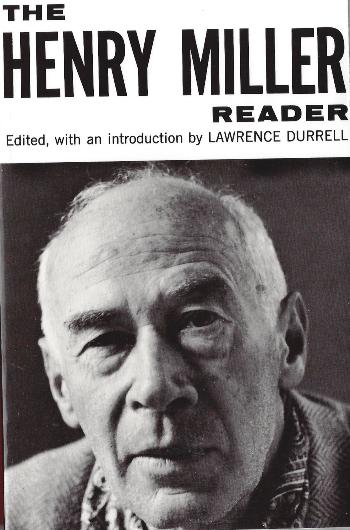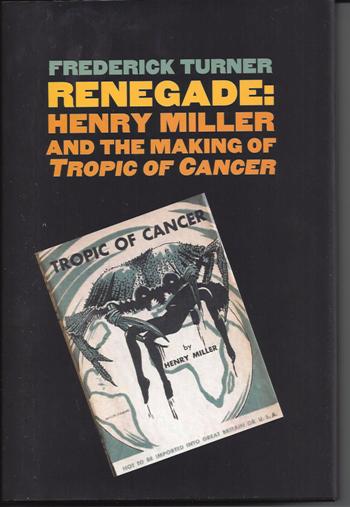 |
INTRODUCTION
by LAWRENCE
DURRELL It would be
invidious to make extravagant claims for the genius of an author the
greater
part of whose best work is not available to his countrymen. This task
were
better left to the critics of a future age who will be able to discuss
it with
the impartiality it deserves. But one thing is certain: both America
and
England will one day be forced to come to terms with him on his own
ground. Yet
perhaps when this time comes-when he can be studied in the light of his
intentions-even the moralists of letters (it is too much to hope that
our
puritan cultures will ever cease to bring forth moralists) may discover
that,
in an inverted sort of way, Miller is really on the side of the angels;
and
that his work, regarded in its totality (as he wishes it to be) is
simply one
of the great liberating confessions of our age, and offers its readers
the
chance of being purged "by pity and by terror" in the
Aristotelian way. It offers catharsis .... But my job
would be best done if I could succeed in situating him in the
literature of our
time-for he does not fit easily into any of the text-book categories.
Indeed he
is rather a visionary, than merely a writer. I suspect that his final
place
will be among those towering anomalies of authorship like Whitman or
Blake who
have left us, not simply works of art, but a corpus of ideas which
motivate and
influence a whole cultural pattern. Miller has
elected to shame the devil and tell the truth, and his work is one of
the
bravest, richest and most consistent ventures in this domain since
Jean-
Jacques Rousseau. By its very nature such a task must transgress the
narrow
limits of what ordinary people regard as permissible; canons of taste,
conventional
ideas of beauty and propriety, they must be renovated in the light of
his
central objective-the search for truth. Often the result is shocking,
terrifying; but then truth has always been a fierce oracle rather than
a bleat
or a whimper. But no one, I think, could read (as I have just done)
through the
whole length and breadth of his work without wonder and amazement-and
finally
without gratitude for what he has undertaken on behalf of us all. It
isn't
pretty, a lot of it, but then neither is real life. It goes
right to the bone. It is absolutely veridic and unflinching in its
intellectual
bravery. It is significant, too, to mention that among the first few
great men
of the day to acknowledge Miller's greatness was a philosopher, Count
Keyserling. I still remember the expression of amazed delight on the
face of
the author of Tropic of Cancer when he unfolded the telegram and read
the message:
"I salute a great free spirit." To grasp the intention is everything.
"I am against pornography and for obscenity," writes Miller; and
again in another place: "My
books are not about sex but about self-liberation"; and yet again:
"The full and joyful acceptance of the worst in oneself is the only
sure
way of transforming it." These statements deserve the reader's fullest
attention. But even if
Miller were not the personage he
happens to be his tremendous prose-gift would have carried him easily
into the forefront
of contemporary writing. This anthology has been designed to show him
in his
various moods and styles, and to illustrate his thinking; for while the
whole
work constitutes "a single, endless autobiography," he is a protean
craftsman and handles every vein, from the short story to the essay,
with equal
ease and delight. I have tried to select the best examples from each
field; I
have also tried to follow him synoptically from the Bowery to Paris,
from Paris
to Greece, and then back to America where he now lives, reconciled (to
judge by
his latest book) to the native country which he has criticized so
harshly, and
of whose literature he is the jewel and nonpareil. Yes, the rogue
elephant of American
literature has found a quiet home at last in California where he waits
patiently
for the time when his work will receive the official clemency it
deserves.
Meanwhile the French and the Japanese
reader (he is a best-seller in both countries) keep him alive and able
to
concentrate on Nexus which is to be his last book. At peace
with his neighbor, reconciled to friend and foe alike, and secure in
the
knowledge of his fame, he awaits the verdict of the young Americans of
the
future-not just the writers, but the ordinary folk as well, artisans,
laborers
and carpenters who buy their fifteen thousand copies of Whitman every
year ....
What will they make of this great tortured confession which spans the
whole
range between marvelous comedy and grim tragedy? It is exciting to
imagine. I
am not gifted with second sight unfortunately but I imagine that they
will
realize that Miller has been honest on behalf of us all, so to speak,
and that
everything which he describes as true of himself is true of every man
jack of
us, particularly what is self-indulgent, perverse or even downright
horrible;
particularly what is silly no less than noble or grand. What he has
tried to do
is to accept and so transform the warring elements in the secret life
of man,
and his work is a record of the battle at every stage. That is really
the
central message of Miller. Great vagabond of literature that he is, he
will not
want for readers among our grandchildren. Lawrence
Durrell
|
|

